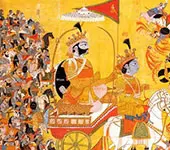You can find three types of governance in the Vedas.
- Dharma Tantra
- Praja Tantra
- Raja Tantra
Click below to listen to Rashtra Suktam
What is Dharma Tantra?
The natural world order set by the divinity is called Rita (ऋत).
Rita is considered a divine power in itself.
Rita is not just for men.
Rita applies to all living and non-living beings.
Rita keeps functioning on its own unless deliberately disturbed.
Dharma Tantra had no external enforcement agency.
It was based on Rita.
The system operated in a natural orderly manner.
There was a spirit of care and protection among people.
They considered it a moral responsibility.
There were no punishments. The land was undivided.
Ref: Rigveda.4.23, Mahbabharata.12.19.14
Why did Dharma Tantra end?
As yugas progress from Satya to Kali, morality decreases.
Compared to Satya Yuga, there is only about 25% of dharma in Kali Yuga.
People become greedy, arrogant, and confused.
Most of them cannot distinguish between right and wrong on their own.
This required the establishment of laws and their enforcement.
Praja Tantra in the Vedas
Praja Tantra is democracy.
Atharva Veda.3.4 speaks of an elected ruler.
This election was largely influenced by public opinion.
A ruler's duty was to protect his people.
He could be removed if he did not perform.
Those who are ousted from power can again seek the position if they improve themselves.
Atharva Veda.3.3 points towards this.
Raja Tantra in the Vedas
Raja Tantra is monarchy.
In the Vedas, Raja Tantra or monarchy is the most prevalent form of governance.
The land was divided.
A king ruled each division.
Kings performed yajnas such as Rajasuya and Ashwamedha to become emperors.
An emperor controlled a vast area.
Those kingdoms under his control paid him taxes.
The succession in a monarchy is hereditary.
Even a hereditary king can lose his position if he doesn't perform well.
Puranas have a legend of Rishis killing King Vena for his wickedness and cruelty.
A king was normally considered adandya (unpunishable).
Yet he was dharmadandya (punishable for violating dharma).
The king protected his people and distributed wealth and resources.
He maintained law and order and endeavored to expand his kingdom.
To do so, he observed Raja Dharma, brahmacharya, and tapas (Atharva Veda.11.5).
Many kings became Rajrshis through dharmik conduct and observing tapas.
For administrative purposes, the kingdom was divided into Janapadas.
Janarajas were the heads of Janapadas.
Janapada was further subdivided into villages or gramas.
Gramas had chiefs who were called Gramanis.
Those who wished to lead these smaller divisions performed yajnas like Sangrahani.
The citizens were collectively called Visha and the king was Visham Pati.
At first, the citizens controlled the administration of the kingdom.
For this, there were Sabhas and Samitis. Later, however, the king relied on his ministers and advisers.
Purohitas also acted as advisors to the kings (eg. Vasishta).
The Purohita's position was next to the king.
Only the flagpost on the king's chariot was taller than the flagpost on the Purohita's chariot.
A Brahmana performed a yajna called Brihaspati Sava to become the Raja purohita.
According to Chanakya, the only effective and viable form of government was the monarchy.
Comments
Read more comments
Knowledge Bank
What is the root cause of fear?
According to Brihadaranyakopanishad, the root cause of fear is the dualistic perception that -something other than me - also exists. To avoid fear, you should see everything as yourself.
Meaning of the shloka, Ma Nishada of Ramayana
Inspired by Brahma to write the story of Sri Rama, Maharshi Valmiki went to the banks of the Tamasa river with his disciple Bharadwaj for bathing and midday rituals. There, they saw a pair of Krauncha birds wandering happily. At that time, the male Krauncha bird was killed by a hunter. Seeing the blood-soaked dead bird on the ground, the female Krauncha cried out in grief. Hearing her sorrowful cry, the compassionate heart of the sage was deeply moved. That same sorrow turned into a verse filled with pathos and emerged from Maharshi Valmiki's lips for the welfare of the world - Ma nishada pratishtham tvam agamah shashvatih samah. Yat krauncha mithunad ekam avadhih kamamohitam. The apparent meaning of the verse is a curse to the hunter—'O hunter, you will not find peace or fame for eternal years, because you have killed one of the Krauncha pair, which was in passion.' But the actual meaning is—'O Lakshmipati Ram, you have killed the world-destroyer Ravana, one of the Ravana-Mandodari pair, and thus, you will be revered for eternity.'
Recommended for you
How Garuda Became So Powerful

Learn what is behind Garuda's power. He was created to replace Indra.....
Click here to know more..How does it feel when Kundalini is awakened?

You will get divine visions, divine smell, or divine taste. You will feel divine touch and hear divine sounds. You will hear mantras and divine stotra....
Click here to know more..Shiva Namavali Ashtakam

he chandrachood'a madanaantaka shoolapaane sthaano gireesha girijesha mahesha shambho. bhootesha bheetabhayasoodana maamanaatham samsaaraduh'kha- gaha....
Click here to know more..
